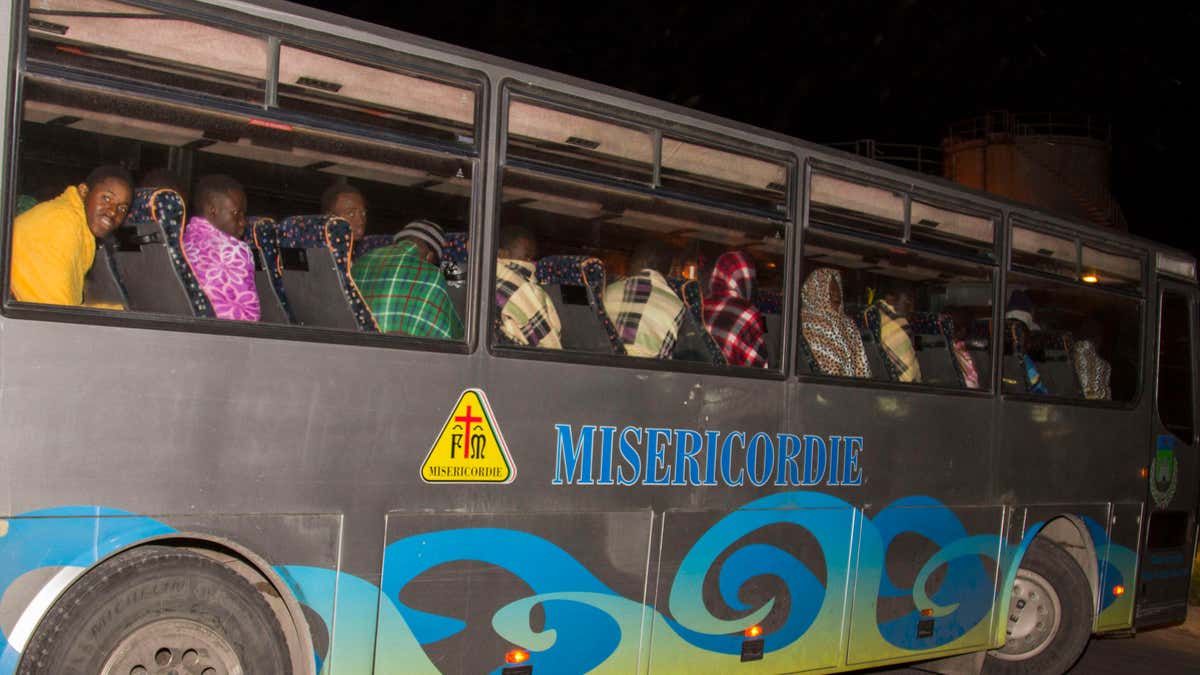
FEb. 9, 2015: Some of the migrants that were rescued at sea sit on a bus in the harbor of Lampedusa. (AP)
As many as 300 people are now unaccounted for in the latest tragedy among migrants crossing the frigid Mediterranean, the U.N. refugee agency said Wednesday.
Migrants were attempting to sail from Libya to Europe in four rubber boats.
The spokeswoman for the U.N. High Commissioner for Refugees, Carlotta Sami, said survivors confirmed the existence of a fourth rubber boat that left Libya for Europe on Sunday, after only three were reported missing.
In a statement, the UNHCR said that means some 300 people are unaccounted for. Earlier, the agency cited survivors as saying 203 people had died in the crossing.
Sami said 203 people had been "swallowed up by the waves," the youngest aged 12.
The deaths add to the 29 reported earlier in the week by the Italian coast guard, which said the victims had died of hypothermia during the voyage that began Sunday in Libya.
The U.N, Save the Children and other aid organizations are sharply criticizing the new EU border patrol operation as inadequate for saving lives. The EU took over Italy's Mare Nostrum operation last year, but the EU's Triton mission only operates a few miles off Italy's coast, whereas Mare Nostrum patrols took Italian rescue ships up close to Libya's coast, where most of the smuggling operations originate.
"The Triton operation doesn't have as its principal mandate saving human lives, and thus cannot be the response that is urgently needed," Laurens Jolles, the head of the U.N. agency for southern Europe, said in a statement.
Save The Children called for the EU to urgently meet to restart Mare Nostrum "or another rescue system that has the mandate, the capacity and means to prevent other tragedies."
The spokeswoman for the European Commission, Natasha Bertaud, said the Triton operation operated by the EU's Frontex border agency cannot possibly do the job with Frontex's 90-million-euro ($101.67 million) total annual budget. Mare Nostrum, which just patrolled the southern Mediterranean, cost Italy 9.5 million euros a month to operate.
"Pointing fingers is not going to get us anywhere," Bertaud said in Brussels. "If we want to talk seriously about improving the situation then we also need to talk about financing it adequately."
The commission is currently conducting a feasibility study into whether a border guard system would be worthwhile, with the first discussions expected to begin next month.
The U.N. and other rescue organizations have long said the EU mission would result in lost lives since the patrols are so far from Libya's coast. Critics of Mare Nostrum, though, had said the Italian patrols so close to Libya only encouraged migrants to take the risk.
The UNHCHR says the recent deaths confirm that there is no deterrent effect from a less-robust operation. In January, 3,528 migrants reached Italy, up by two-thirds from 2,171 in the first month of 2014, a year that brought 170,100 migrants to Italy's shores.
The Associated Press contributed to this report.
